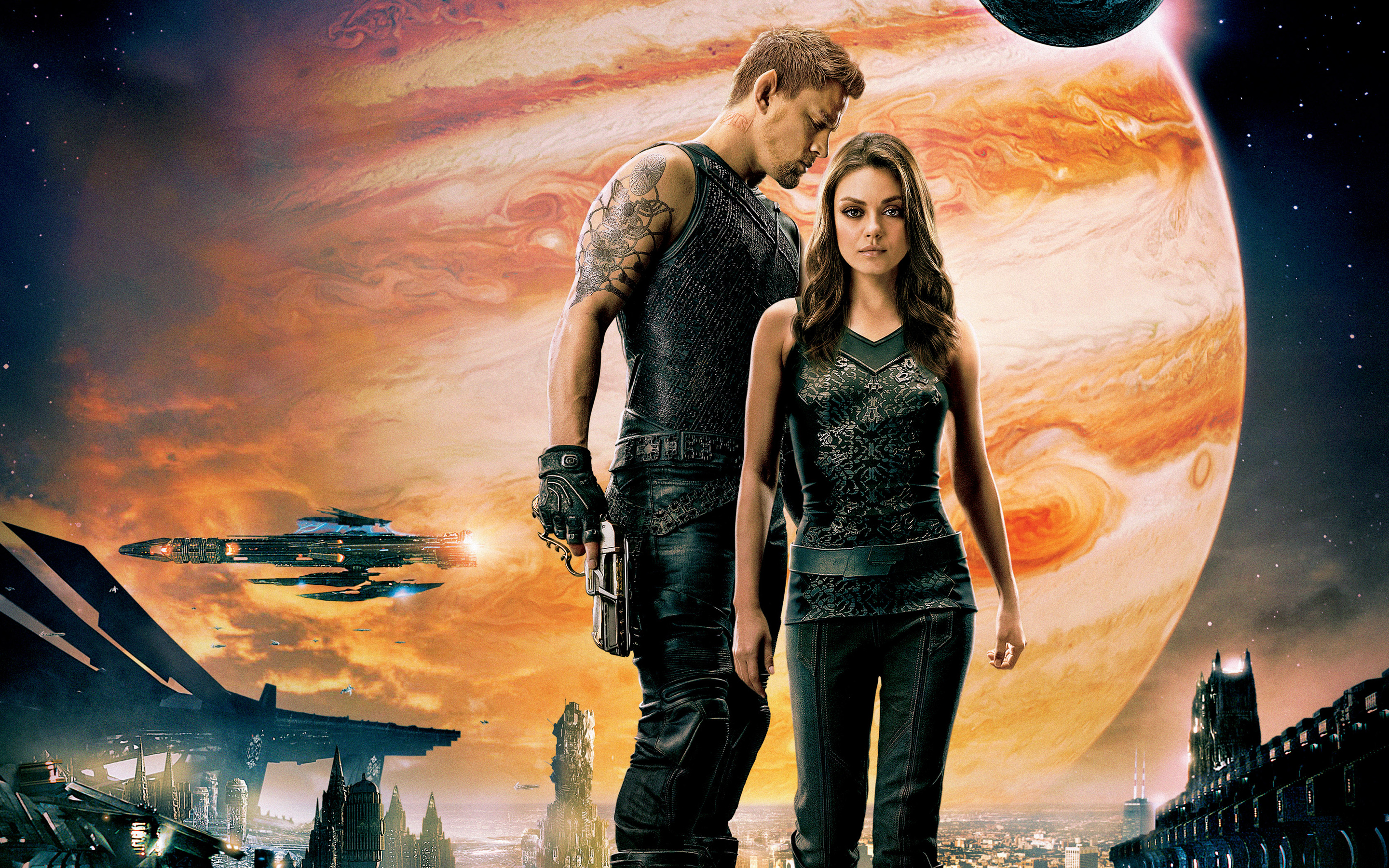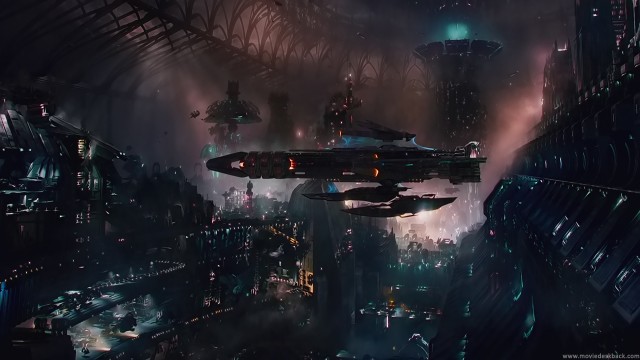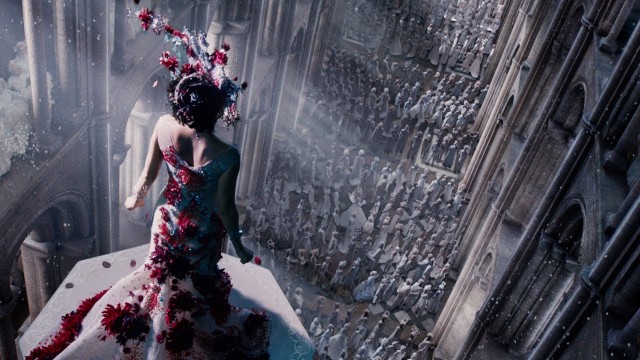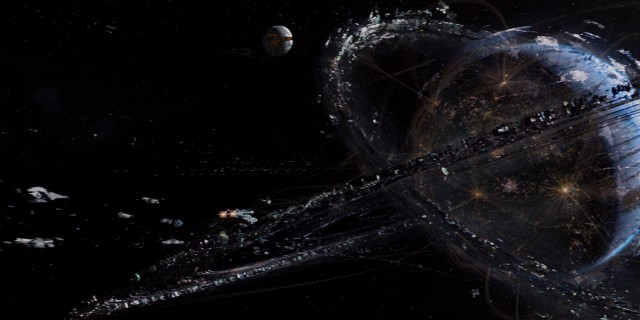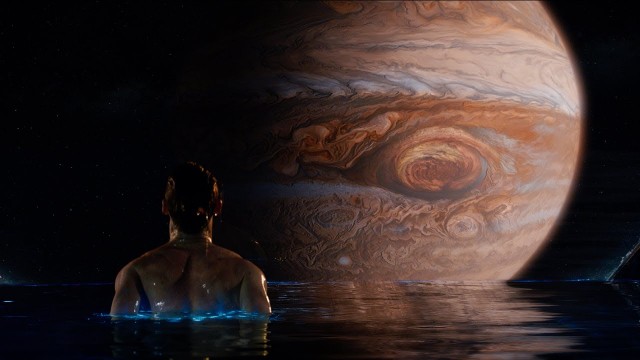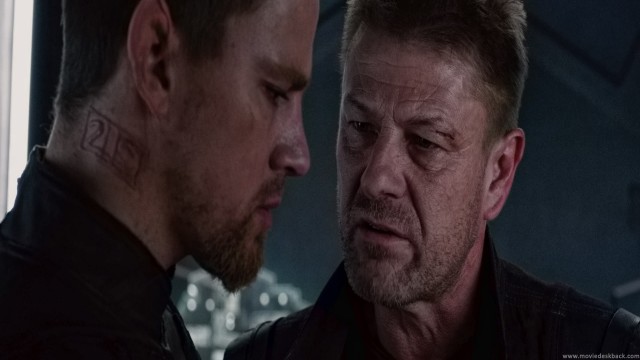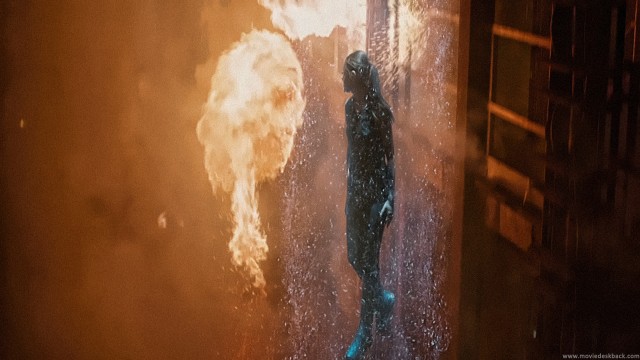Jupiter Ascending is a captivating and original visual marvel that sports a colossal scale and highly commendable creative vision. It’s also an over-stuffed narrative disaster with flat personalities that betray their otherwise effectively quirky designs.
The daunting scale of Jupiter Ascending is certainly no joke, considering that the movie was delayed for almost eight months out of its planned July 2014 premiere date, just so that Warner Bros. was able to adequately render and capture the Wachowski siblings’ wild vision. It’s proven to be quite a costly box office flop as well, sporting an enormous budget of nearly $200 million, and not even taking in a quarter of that domestically so far.
This is as disappointing as the movie itself, since it’s very evident that Jupiter Ascending is a labour of love for the Wachowski’s, just as the also-disappointing Cloud Atlas was before it. The movie is certainly not bad, and if nothing else, it’s certainly beautiful, flashy and has plenty of exciting action, but as a true sci-fi opus, it widely misses the mark.
When it comes down to it, despite all of its good intentions and courageous imagination, Jupiter Ascending is ultimately sunk from forgetting the fundamentals of a good movie. It may be visually stunning and frenetically exciting, but none of that matters when the characters have no real depth, and the story can’t even seem to keep its own lore straight. It sadly results in an early February blockbuster that feels creatively robust, yet narratively anemic, leading to what simply amounts to an over-expensive, overdone let-down.
The main character of Jupiter Ascending, Jupiter Jones, is a bitter cleaning woman played by Mila Kunis, who proudly proclaims that she hates her life. Little does Jupiter realize however that she is some sort of child of destiny, a reincarnation of the matriarch of a powerful space tycoon family, and that makes her a highly sought after person by forces beyond her world.
It sounds promising to start, except Jupiter immediately ranges from being boring at best and detestable at worst. She’s a flighty, lazy and generally cynical character, which immediately makes her hard to root for. Things only get worse when the movie tries to place heavy emphasis on Jupiter having a love story with Channing Tatum’s character, a genetically-engineered wolf-man mercenary named Caine Wise, who is hired to bring Jupiter back to, er, Jupiter, for reasons that will quickly end up convoluted and confusing.
Tatum gets a better deal than Kunis, since his character is at least cool and fun to watch. Likewise, Tatum’s rapport with Sean Bean, playing another retired merc named Stinger, is effective and engaging in an unpredictable ‘every man for himself’ sort of way. Jupiter however can often be a shallow nuisance, who doesn’t really find her spine until the end of the movie, and even then, she’s a pretty ineffective hero.
But by far the worst offender with the lead character arcs is the woefully misguided decision to give Jupiter and Caine a love story. These two characters have absolutely no chemistry whatsoever, and seeing Jupiter suddenly fawn over Caine at a certain point is so abrupt and random that it comes off as unintentionally hilarious. The romantic dialogue that Kunis and Tatum are forced to share is downright cringe-worthy as well, with the infamous, “I love dogs, I’ve always loved dogs…” line that even the trailer saw fit to draw attention to for some reason being easily the most painful and hysterically hollow, sure to become an internet meme of some variety.
The ‘villains’ of the movie, so to speak, are the Abrasax family, specifically three siblings, Titus, Balem and Kalique. The three are warring with each other over control of a key cornerstone of intergalactic health care (or something), and their motivations and individual game plans are so tangled and messy that none of them really look upstanding or competent. Maybe that’s the idea, but it leaves audiences needlessly confused about who they should be rooting for, and who they should be rooting against, and why. Making matters worse is that the Wachowski’s have told these actors to try and add as much quirkiness to the Abrasax siblings as they can, but this just leaves them all coming off as if they have varying degrees of brain damage. It’s pretty underwhelming.
Even when the movie does try and pick a chief villain for a forced climax, it’s difficult to discern why this villain is any better or worse than their equally conniving siblings, who just disappear from the movie never to be seen again at certain points in the story. It’s yet another instance of Jupiter Ascending clearly biting off more than it can chew, with the supposed existential crisis that Jupiter is supposed to be going through getting lost in the shuffle of schemes and betrayals, with a lack of restraint and tact that even George R.R. Martin would find excessive.
By the end of the movie, Jupiter Ascending’s flat, and yet strangely overdone characters make all of the pomp and spectacle feel like so much ado about nothing. Its glossy window dressing just means nothing when its individual personalities are so difficult to care about.
Jupiter Ascending is a spectacular mess of good ideas that don’t feel effectively polished or refined enough to really come together. The movie often feels like it’s made up of an entire trilogy of movies that were all squeezed into one single movie, creating a rapidly-paced movie that feels like it’s rushing through its grand, space opera-esque tale of intrigue and woe. It’s the very definition of a blockbuster collapsing under its own weight.
The gist of the storyline is that Jupiter is the reincarnation of a family of extra-terrestrial tycoons (somehow), and this entitles her to having final claim on the tycoons’ fortunes (somehow), leading to the surviving siblings all conspiring against each other to use Jupiter to monopolize their empire (somehow).
Obviously, there’s a lot of holes in this setup, which is praiseworthy for attempting a fully original concept, but it was perhaps better off trying to work in more established convention. Jupiter Ascending tries so hard to create the next big sci-fi epic, but in its narrative haste, it feels unpolished and sloppy in terms of how it actually tells its story. Too little is explained, and too much of the world’s lore feels half-constructed and non-sensical.
Ultimately, you can’t watch Jupiter Ascending for the story, since you’ll frequently be left scratching your head, and by the end, you’ll be wondering what was even supposed to be accomplished. It’s a lot of noise without much in the way of real substance, making it feel like a story with plenty of heart, but not really very much brains behind it.
The Wachowski siblings are certainly not bad directors. In fact, they’re sublime visual directors at the very least, and they have displayed at least some competence with filming more dramatic, character-driven dialogue scenes. Jupiter Ascending is something that the Wachowski’s have clearly put a lot of love and care into. Painstaking detail has gone into realizing the movie’s scale and complexity, at least in terms of the actual shooting, and you can see at every turn how passionate they were about realizing this labour of love.
Perhaps the problem however is the fact that the Wachowski’s were approved for a nearly $200 million budget by Warner Bros., and proceeded to go nuts with it, at the expense of the script and characters. As much as Jupiter Ascending does indeed feel like a grand and impressive space opera in terms of its presentation, the attempts to frame dialogue scenes fall flat, and any scene that isn’t an action scene just feels dull as a result. The only exception is a montage of intergalactic bureaucracy when Jupiter first tries to deal with government obligations outside of Earth, which is the one time where the Wachowski’s actually design a memorable and amusing sequence of events, which might have felt right at home in the Harry Potter saga, if it were a space opera.
The Wachowskis’ clear love of Japanese anime also shines through in several scenes, and with certain characters that definitely feel like they jumped out of the pages of a manga. Spacefaring anime is certainly common, so the Wachowski’s have plenty of hommage potential to work with, and anime fans may notice a few subtle nods to some particularly beloved sci-fi anime sagas throughout Jupiter Ascending.
But for all of the effort that the Wachowski’s put into helming a great work of art, this is a ship too large and hefty to steer on largely their own shoulders. It often feels like the Wachowskis’ own movie gets away from them, leading to a movie that is easy to watch, colourful and extraordinarily well-produced in terms of visuals and scale, but one that also feels like it suffers from ‘George Lucas Syndrome’, generally being more interested in distracting audiences with flashy action and abstract sets, rather than actually remembering to tell a worthwhile story underneath it all.
Again, the Wachowskis’ love of anime is pretty evident, in this case within the music of Jupiter Ascending. The score consists of much of the same bombastic orchestra that virtually every blockbuster these days likes to flock to exclusively, but there’s definitely more of an anime vibe to the crescendos that emphasize both high adventure and exotic wonder. It’s not a standout score by any means, particularly for the guy who composed Lost and The Incredibles, but it gets the job done.
As for the soundtrack, it also echoes an undeniable anime vibe, with the futuristic weaponry having that reliable ‘pew-pew’ tone, and everything whizzing, humming and whirring as it would in a Japanese OVA. The clash of styles continues to work in the favour of an American-made Hollywood production, and while it feels undeniably inspired by the Japanese anime style, Jupiter Ascending blends just enough familiar Hollywood style into the audio to give it its own sense of unique character amongst the directors’ other works, and most sci-fi movies in general.
The audio gets particularly intense in the IMAX 3D cut, naturally, which makes the deafening plasma and shredding anti-gravity boots sound through the theatre with much more fervor and fury. If you’re going for the action, it’s a worthy upgrade to the already powerful action moments, if you have the spare funds for it.
For all of its disappointing elements, Jupiter Ascending at least excels in the visual department. The movie is extremely striking, being true cinematic eye candy, and bringing to the forefront a world far more wondrous and inviting than it has any right to be, considering the rampant issues with the screenplay.
Indeed, when the story falters, as it is wont to do, the compelling sets and creatures that the Wachowski’s have created still effectively keep viewers immersed in the experience. There isn’t one place that feels less than exceptionally realized, which at least allows audiences to take in the wonder of this space odyssey with the same wide-eyed glee as Jupiter herself.
For those opting to see the movie in 3D, the experience only gets better as well. The 3D presentation is quite well done, making the action sequences noticeably more visceral, and the atmospheric scenes exceptionally more potent. My screening was in IMAX 3D, and that only made the visual elements even better. Jupiter Ascending’s scale is easiest to appreciate on an IMAX screen, with the 3D elements now being extra potent, and helping to bring the experience to life in a big way. Putting aside the heftier cost of an IMAX 3D ticket, those wishing to get the most out of the experience should consider the IMAX 3D cut, if they have the means. If not however, a standard digital 3D screening is still an optimal way to experience the movie, with slightly more immersion and fun than what would be offered watching the movie flat in 2D.
Even just in 2D however, Jupiter Ascending is an amazing spectacle, which is why it’s difficult not to wish that so much visual splendour wasn’t reserved for a better movie. If nothing else though, it’s a dazzling spectacle of sci-fi filmmaking that merely has the misfortune of wrapping itself around a faulty script.
Jupiter Ascending put up red flags the very second that it necessitated a delay of over six months just to finish post-production, and it feels like a rather pricey cautionary tale of what happens when artistic and creative ambition overtakes the bare fundamentals of spinning a good story with a worthy cast. Even talented actors like Mila Kunis and Channing Tatum feel wooden in a story so hollow and slapdash, and while the movie is a true visual masterpiece, it doesn’t have much else to offer for avid sci-fi fans.
It’s comforting to see that the Wachowski’s are still preferring to do their own original stories, which they continue to write, direct and produce themselves, rather than adapting existing material. Despite their best intentions however, Jupiter Ascending’s reach is well beyond its grasp, making for a blockbuster that is impressive more for its concept and ambition than for its actual final product.
If you enjoy visually stimulating blockbusters, then Jupiter Ascending’s breathtaking production values are engrossing enough to potentially allow sci-fi fans with adjusted expectations to appreciate the movie for what it is. For most though, Jupiter Ascending is a whole lot of promise that ultimately amounts to nothing but a heartbreaking missed opportunity.

